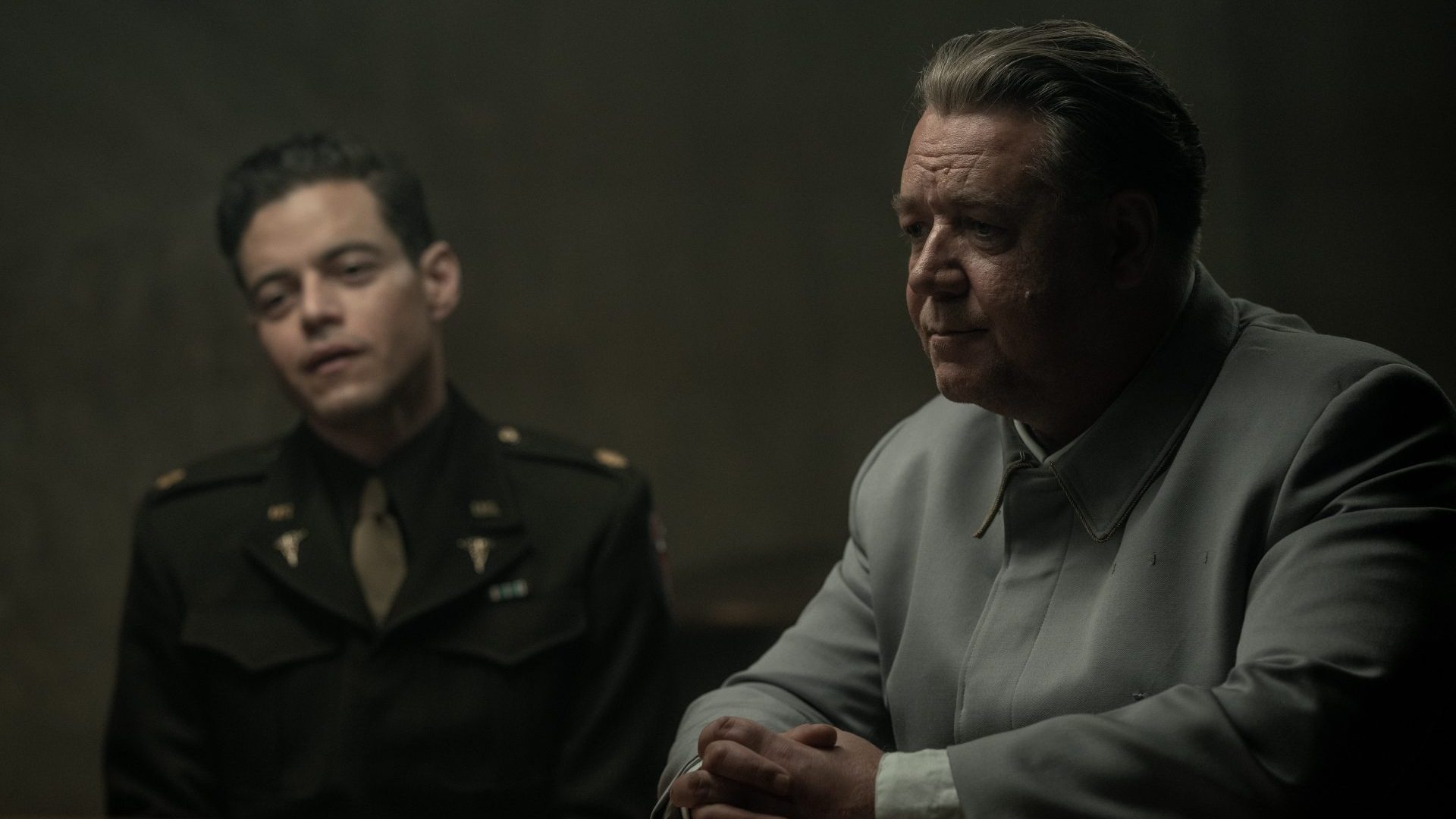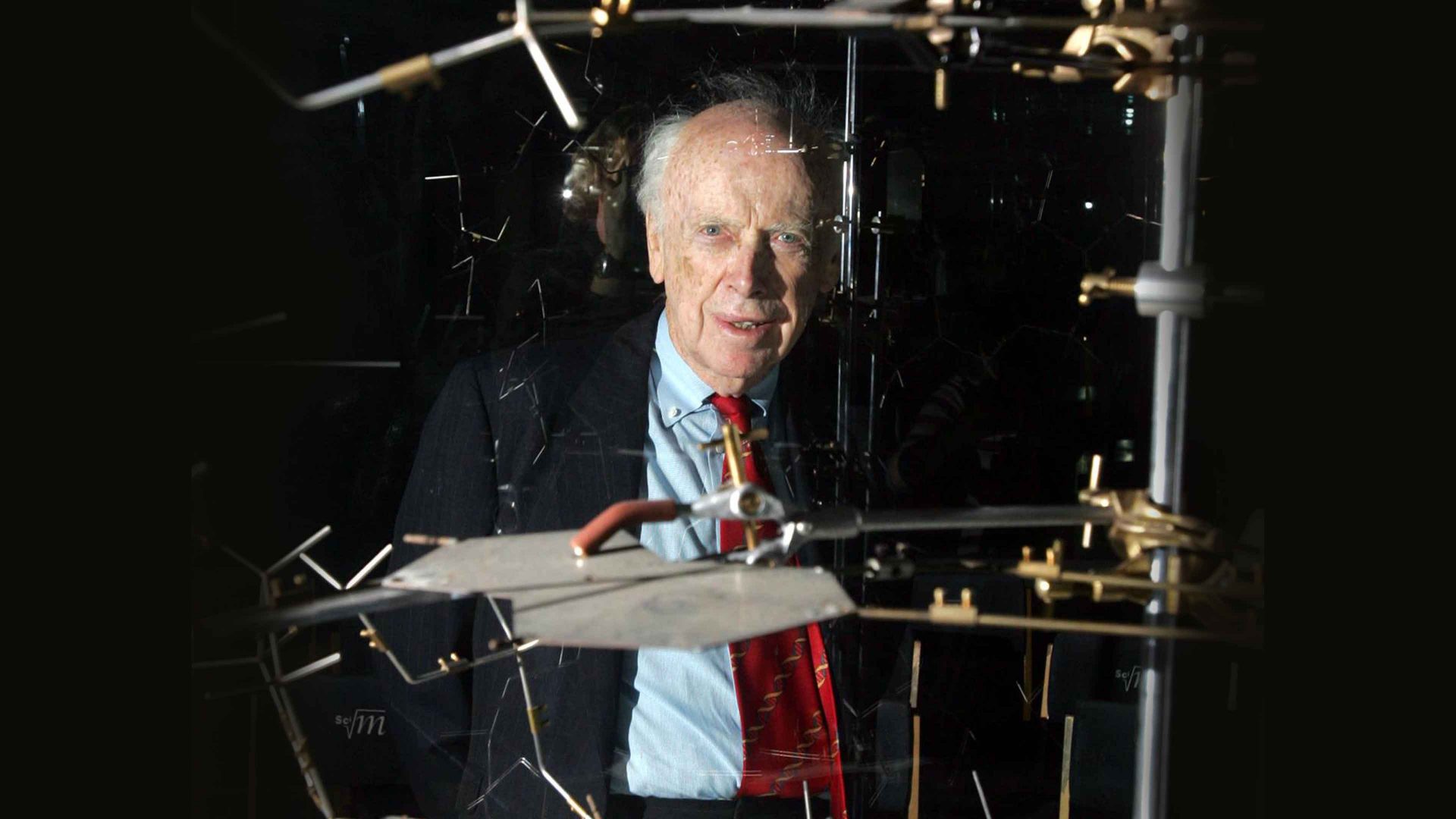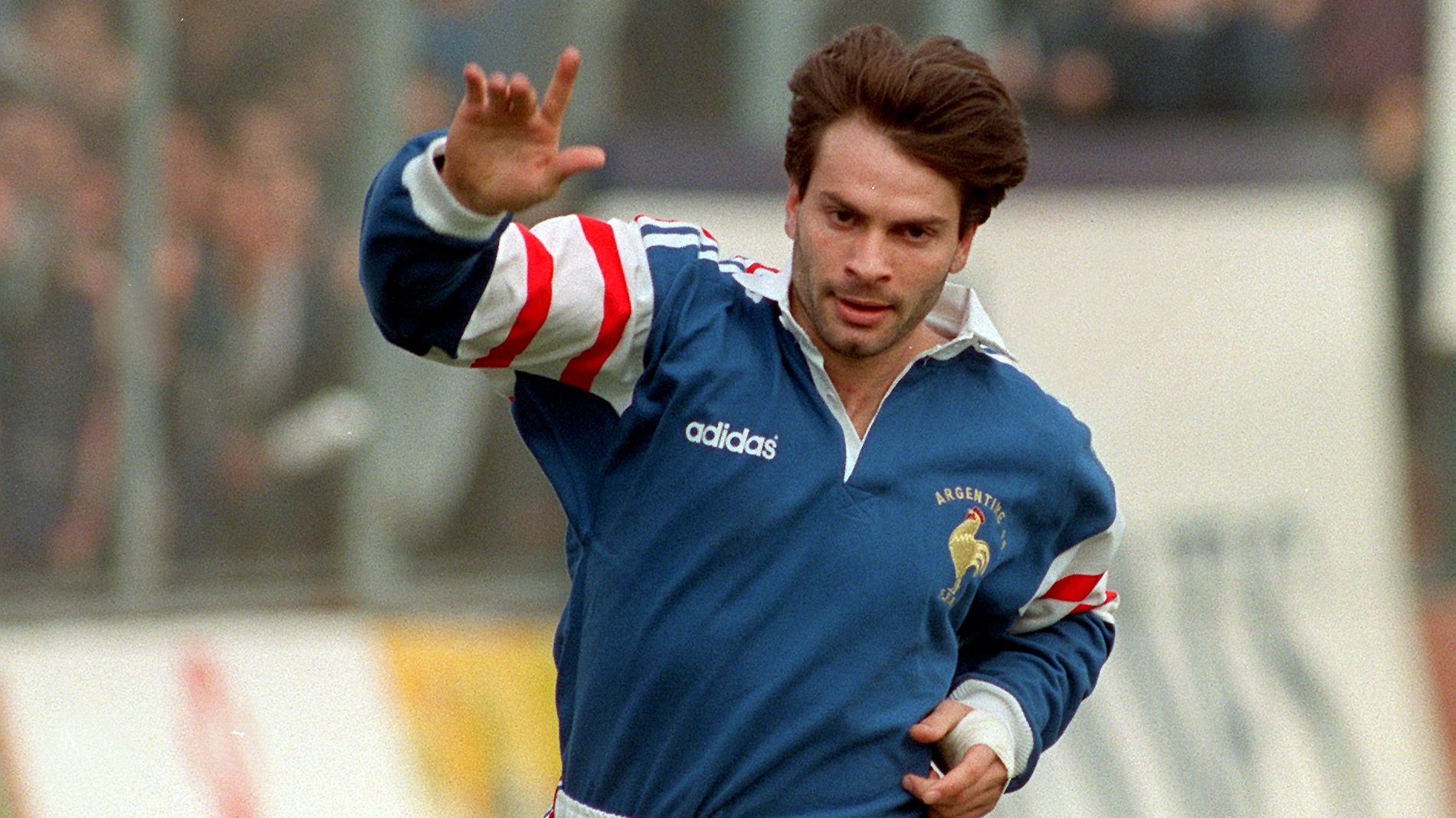PICK OF THE WEEK
Nuremberg (general release)
Primo Levi, the greatest chronicler of Auschwitz and its horrors, warned that to seek an explanation for the Holocaust was a perilous enterprise. It “cannot be comprehended, or rather, shouldn’t be comprehended, because to comprehend is almost to justify.”
Yet, in James Vanderbilt’s compelling movie, this is precisely what US army psychiatrist Dr Douglas M Kelley (Rami Malek) sets out to do; believing that, in his interviews with the 22 Nazi leaders awaiting trial for war crimes at Nuremberg, he can isolate a psychiatric condition or specifically German mentality that made them capable of the worst atrocities in history. “If we could psychologically define evil, we could make sure something like this never happens again,” he says to his interpreter Sgt Howie Triest (Leo Woodall).
The most formidable of the prisoners is former Reichsmarschall Hermann Göring (Russell Crowe), Hitler’s second-in-command, who believes that the trial, mounted by the four Allied nations, offers him a pulpit from which to inspire the rebirth of Nazism. Nobody is more aware of this than US supreme court justice Robert H Jackson (Michael Shannon), who has risked all on the intellectual and moral proposition that the scale of the Nazis’ crimes requires a new international jurisprudence and the establishment of a multinational jurisdiction.
In his urbane conversations with the British prosecutor David Maxwell-Fyfe (Richard E Grant), who would go on to be an architect of the European Convention on Human Rights, one hears the genius and audacity of true statesmen, seeking to establish an international legal order that, they hope, will ensure that a crime against humanity like the Shoah can never happen again.
The dramatic heart of the movie, however, is the dialogue between Göring and Kelley: a dance of dangerous intimacy that is part chess game, part emotional manipulation. Malek has never been better: italicised, edgy and recklessly ambitious. Crowe, meanwhile, is a slab of a man, deploying his physique and amiable features with brilliance to communicate the Nazi’s aura of menace, charisma and capacity for violence. He is fascism made flesh.
The terrible truth, Kelley soon concludes, is that what happened in Germany between 1933, when Hitler became chancellor and 1945, by which time 70 million had died, could have happened anywhere. Humanity’s talent for organised savagery is innate, not peculiar to any people or nation. In the juxtaposition of real-life footage from the liberated camps (to which no language is equal) and Kelley’s growing warmth towards Göring’s family (to whom he takes letters) lies an unspeakable tension that tears him to pieces. How can he reconcile the two? He cannot.
Nuremberg is not as innovative a movie as Jonathan Glazer’s The Zone of Interest (2023) nor as much of a cinematic milestone as Steven Spielberg’s Schindler’s List (1993). But at a time when Holocaust denial and World War II historical revisionism are more mainstream than ever, its dramatic power is urgently needed.
The book upon which it is based – Jack El-Hai’s The Nazi and the Psychiatrist (2013) – is also well worth your time. But for a broad introduction to the subject, nothing matches Philippe Sands’ masterly East West Street: On the Origins of Genocide and Crimes Against Humanity (2016).
STREAMING
Being Eddie (Netflix)
After more than four decades, it is hard to communicate the impact that the 21-year-old Eddie Murphy made on the international cultural scene with his movie debut in Walter Hill’s 48 Hrs (1982). By then, he was already a cast member of Saturday Night Live, having joined the show at the age of 19.
Next came John Landis’s Trading Places (1983) which was, as Hollywood mogul Jeffrey Katzenberg puts it, “as close to a perfect movie as you can have, in my opinion”. By the time Martin Brest’s Beverly Hills Cop (1984) opened, Murphy was the biggest star in the world (I can remember queuing round the block to see it at my local cinema, in the days when moviegoers routinely queued to see blockbusters).
In Angus Wall’s enjoyable documentary, the 64-year-old looks back on one of the most consequential careers in postwar entertainment. Along with Oprah Winfrey, Barack Obama and a handful of others, he was part of “the first generation of Black overachievers… that’s what we got from [Muhammad] Ali”.
Dave Chappelle, Chris Rock, Tracy Morgan, Jamie Foxx, and Kevin Hart all pay homage to his comic inspiration. “I was the psychological soil that was required for everything that happened after me,” he says – referring to Denzel Washington, Morgan Freeman and Spike Lee. Murphy comes across as a thoroughly likeable man; but he has no use for false modesty.
It has not all been plain sailing. There were moments when his movie career appeared to have stalled or even ended. But Chappelle is typically astute in his observation that “the core of him seems unscathed by it – even though I’m sure he’s got scars.”
The secret? Well, he didn’t drink, smoke or do drugs. More than that, he cultivated an attitude of confidence tempered by patience. The ambition was not snuffed out by setbacks. When he wanted to play multiple roles in Tom Shadyac’s The Nutty Professor (1996), he was quite happy to audition – a remarkable concession for such an established star.
Murphy is reported to have signed a $70 million development deal with Netflix and there are even rumours that he is about to return to stand-up, 38 years after his last such appearance in the still-hilarious Raw. Then again, he might not. When he says that “I’d rather just be home doing nothing,” you can tell that he means it – and has earned it.
STREAMING
Pluribus (Apple+)
This terrific new series from Vince Gilligan – creator of Breaking Bad and Better Call Saul – opens with a funny riff on Robert Zemeckis’ Contact (1997), in which Jodie Foster as Dr Ellie Arroway detects a radio signal of extraterrestrial origin. In this case, the message communicates a genetic RNA sequence. But to what end?
Rhea Seehorn is best-selling fantasy romance writer Carol Sturka, wearied by the adoring groupthink of her fans who settle for “mindless crap”. Her manager and wife Helen (Miriam Shor) takes her for a drink to cheer her up – and is suddenly afflicted by terrible convulsions.
In the mind-bending hours that follow, Carol learns that humanity has been connected as a single hive-mind. “We is ‘us’,” say those she speaks to. “Just ‘us’.” More than 800 million people have died in the process of “joining” – upon learning which, the furious and frightened Carol says: “I guess you gotta break a few eggs, huh?”
The upside is that there is no more murder, crime or racism. The infected are not marauding zombies but impeccably polite global citizens whose mantra is: “We just want to help, Carol.” Twelve other people on the planet have retained their individuality. But when she meets some of them at a summit in Bilbao on Air Force One – requisitioned by a man from Mauritania – she is appalled to discover that she is alone in her absolute horror at what has happened.
Though Pluribus is set, like Breaking Bad and Better Call Saul, in Albuquerque, New Mexico, and stars the excellent Seehorn (so good as Kim Wexler in Saul), it has little else in common with those two smash hit dramas. This time, Gilligan’s framing is speculative and philosophical: is utterly bland social conformity a price worth paying for planetary harmony? Is individual freedom more important than collective peace?
It is no accident, either, that Carol’s smiling chaperone Zosia (Karolina Wydra) talks like ChatGPT and lacks all irony. When Carol says in despair that she wants a hand grenade, Zosia delivers one to her front door. Gilligan has said that he hates AI, which he regards as “an endlessly regurgitating loop of nonsense”. The credits pointedly announce that “this show was made by humans”.
Three of the nine episodes are now available to stream. A second season is already in the works.
BOOK
The Cat, by Georges Simenon (Penguin Classics)
One of the best presents I have ever been given was a huge box set of the Inspector Maigret novels that Georges Simenon (1903-89) wrote at an astonishing clip. It was not unusual for him to finish a manuscript in a fortnight, or even, on one occasion, in 25 hours.
The Cat (1967), however, is one of his romans durs, or literary novels, here reissued in a fine new translation by Ros Schwartz. Émile and Marguerite Bouin, respectively 73- and 71-years-old, live in an inner-city Parisian neighbourhood – much of which was built by her once-wealthy family. They have both been married before: Émile, a former building site foreman, to “a sturdy country girl, with strong, coarse red hands”, Marguerite to a genteel musician who was first violin at the Paris Opera.
Within the first few pages, it becomes clear that what might have been the contented union of two lonely, widowed people has become a brutal emotional cold war in which husband and wife do not speak to one another but communicate through pithy, waspish notes. Not that words are necessary. They read each other all too well: “A shiver, a curling of the lip or a fleeting glimmer in their eyes was sufficient”.
The casus belli, we learn, was the death of Émile’s beloved cat, Joseph, which Marguerite hated. He was certain that she had poisoned Joseph while he was in bed suffering from flu, and, in retribution, had horribly injured her parrot, Coco.
As always, Simenon’s prose is both spartan and rich with meaning. The brutal acts are proxy murders. Émile knows that Marguerite despises his blue-collar ways: “Had she not often made him aware of the gulf that separated them and that nothing could bridge?” She, meanwhile, regards him as “no more than an interloper and, deep down, she must accuse him of having tricked his way into her house.”
The consequence is that “[e]ach felt like a victim and considered the other to be a monster”. At the same time, their seething resentment is matched by a terrible, claustrophobic co-dependency, which is Simenon’s true subject. Superb.




